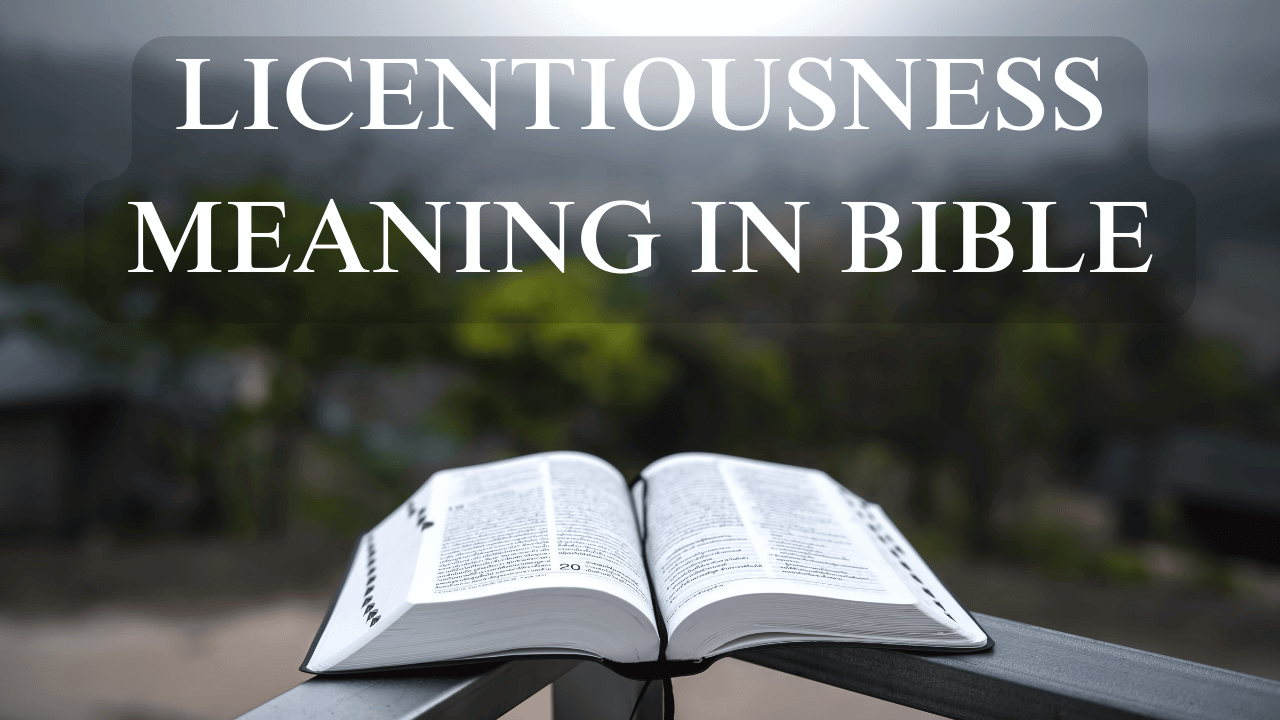Discover the Meaning of Licentiousness in the Bible
Answer: In the Bible, licentiousness refers to a lack of moral restraint, especially regarding sexual conduct. It is often condemned as a sinful behavior that contrasts with the principles of self-control and purity advocated in scripture. Understanding its context highlights the importance of living a life that aligns with biblical ethics and virtues.
The Bible, a cornerstone of the Christian faith, guides moral and ethical behavior. Among the various concepts addressed in the Bible, “licentiousness” is a term that often prompts curiosity and deeper examination. What does it mean, and why is it significant in biblical teachings? This blog post will explore the meaning of licentiousness in the Bible, its implications for believers, and how it contrasts with a life of righteousness.
Understanding Licentiousness
Definition of Licentiousness
In a biblical context, Licentiousness refers to a lack of moral restraint, especially in matters of sexual conduct. It encompasses behaviors contrary to the ethical and moral guidelines outlined in the Scriptures. The term is derived from the Latin word “licentia,” meaning “freedom” or “license,” which in this context implies an abuse of freedom leading to immoral actions.
Biblical References to Licentiousness
Licentiousness is mentioned several times in the Bible, often in conjunction with warnings against immoral behavior. Here are a few key references:
- Romans 13:13: “Let us walk properly, as in the daytime, not in orgies and drunkenness, not in sexual immorality and sensuality, not in quarreling and jealousy.”
- Galatians 5:19-21: “Now the works of the flesh are evident: sexual immorality, impurity, sensuality…those who do such things will not inherit the kingdom of God.”
- Ephesians 4:19: “They have become callous and have given themselves up to sensuality, greedy to practice every kind of impurity.”
Licentiousness in the Bible is often condemned as a departure from moral discipline, reflecting an unrestrained indulgence in sinful desires
Timothy Keller
These verses highlight the negative connotations of licentiousness and its opposition to a godly life.
The Impact of Licentiousness on Spiritual Life
Consequences of Licentious Behavior
Engaging in licentious behavior has several detrimental effects on one’s spiritual life:
- Separation from God: Persistent immoral behavior can create a spiritual chasm between individuals and God, leading to a loss of spiritual intimacy and guidance.
- Guilt and Shame: Living contrary to biblical teachings often results in feelings of guilt and shame, which can impede spiritual growth and well-being.
- Hindrance to Spiritual Growth: Immoral actions can obstruct personal development and maturity in faith, preventing believers from reaching their full potential in their spiritual journey.
Do you know Lee in the Bible: Discover Its True Significance
The Call to Holiness
The Bible calls believers to a life of holiness, the antithesis of licentiousness. Holiness involves living by God’s commandments and striving to reflect His character in one’s actions and attitudes. Key scriptures emphasizing holiness include:
- 1 Peter 1:15-16: “But just as he who called you is holy, so be holy in all you do; for it is written: ‘Be holy because I am holy.'”
- 1 Thessalonians 4:7: “For God did not call us to be impure, but to live a holy life.”
These verses underscore the importance of pursuing a holy lifestyle as a testament to one’s faith and devotion to God.
Distinguishing Licentiousness from Liberty
Liberty in Christ
The Bible speaks of the liberty that believers have in Christ. This liberty refers to freedom from the bondage of sin and the legalistic requirements of the Old Testament law. However, this freedom is not a license to indulge in immoral behavior. Paul addresses this in his letters:
- Galatians 5:13: “You, my brothers and sisters, were called to be free. But do not use your freedom to indulge the flesh; rather, serve one another humbly in love.”
- 1 Peter 2:16: “Live as free people, but do not use your freedom as a cover-up for evil; live as God’s slaves.”
The term licentiousness, as used in biblical texts, signifies a rejection of divine law, leading to a life unbound by ethical or moral standards
N.T. Wright
Misinterpretation of Freedom
There is a risk of misinterpreting Christian liberty as an endorsement of licentiousness. True Christian freedom is about liberation from sin and living a life that honors God. It is not a permit to act without moral restraint. Believers are encouraged to discern and differentiate between the two.
Practical Steps to Avoid Licentiousness
Cultivating Self-Control
Self-control is a fruit of the Spirit (Galatians 5:22-23) and is essential in resisting licentious behavior. Practicing self-control involves:
- Mindfulness: Being aware of thoughts and actions and their alignment with biblical teachings.
- Accountability: Having trusted friends or mentors who can provide guidance and support in maintaining moral integrity.
- Prayer and Meditation: Seeking God’s strength and wisdom to overcome temptations and make righteous choices.
Here is Double Rainbow in the Bible: Symbolism and Spiritual Meaning
Embracing Community
Engaging with a faith community provides support and encouragement to live a holy life. Churches and small groups offer:
- Fellowship: Building relationships with other believers who share similar values and goals.
- Teaching and Discipleship: Learning from biblical teachings and the experiences of others.
- Service Opportunities: Participating in acts of service that promote spiritual growth and moral discipline.
The Role of Repentance and Forgiveness
Importance of Repentance
When believers falter and engage in licentious behavior, repentance is crucial. Repentance involves:
- Acknowledging Sin: Recognizing and admitting one’s wrongdoing.
- Seeking Forgiveness: Asking God for forgiveness and making amends where possible.
- Turning Away from Sin: Committing to change and striving to live according to God’s commandments.
Biblical warnings against licentiousness highlight the dangers of living without self-control, underscoring the importance of righteousness and purity
John Piper
Assurance of Forgiveness
The Bible assures believers of God’s readiness to forgive those who genuinely repent:
- 1 John 1:9: “If we confess our sins, he is faithful and just to forgive us our sins and to cleanse us from all unrighteousness.”
- Psalm 103:12: “As far as the east is from the west, so far has he removed our transgressions from us.”
This assurance provides comfort and motivation for believers to seek forgiveness and pursue a holy life.
FAQs about Licentiousness in the Bible
What is the difference between licentiousness and liberty in Christ?
Licentiousness involves a lack of moral restraint and indulgence in sinful behavior, while liberty in Christ refers to freedom from the bondage of sin and the law. Christian liberty is not a license to sin but an opportunity to live righteously.
How can I avoid falling into licentious behavior?
Cultivating self-control, engaging with a supportive faith community, and practicing regular prayer and meditation are effective ways to avoid licentious behavior.
What should I do if I have engaged in licentious behavior?
Repentance is crucial. Acknowledge your sin, seek God’s forgiveness, and commit to avoiding sinful behavior. Trust in God’s promise of forgiveness and strive to live a holy life.
Are there any biblical examples of licentious behavior?
Yes, the Bible provides examples of licentious behavior and its consequences, such as in the stories of Sodom and Gomorrah (Genesis 19) and the downfall of King Solomon due to his indulgence in immoral relationships (1 Kings 11:1-11).
Why is licentiousness considered a severe sin in the Bible?
Licentiousness is considered severe because it directly opposes God’s commandments and leads to a separation from Him. It hinders spiritual growth and can harm one’s relationship with God and others.
Conclusion
Understanding the meaning of licentiousness in the Bible is essential for believers seeking to live a life that honors God. Licentiousness represents a lack of moral restraint and indulgence in sinful behavior contrary to the Scriptures’ teachings. By cultivating self-control, engaging with a faith community, and practicing repentance, believers can avoid the pitfalls of licentiousness and pursue a life of holiness. May this exploration of licentiousness inspire you to examine your own life and strive for spiritual growth and moral integrity.







